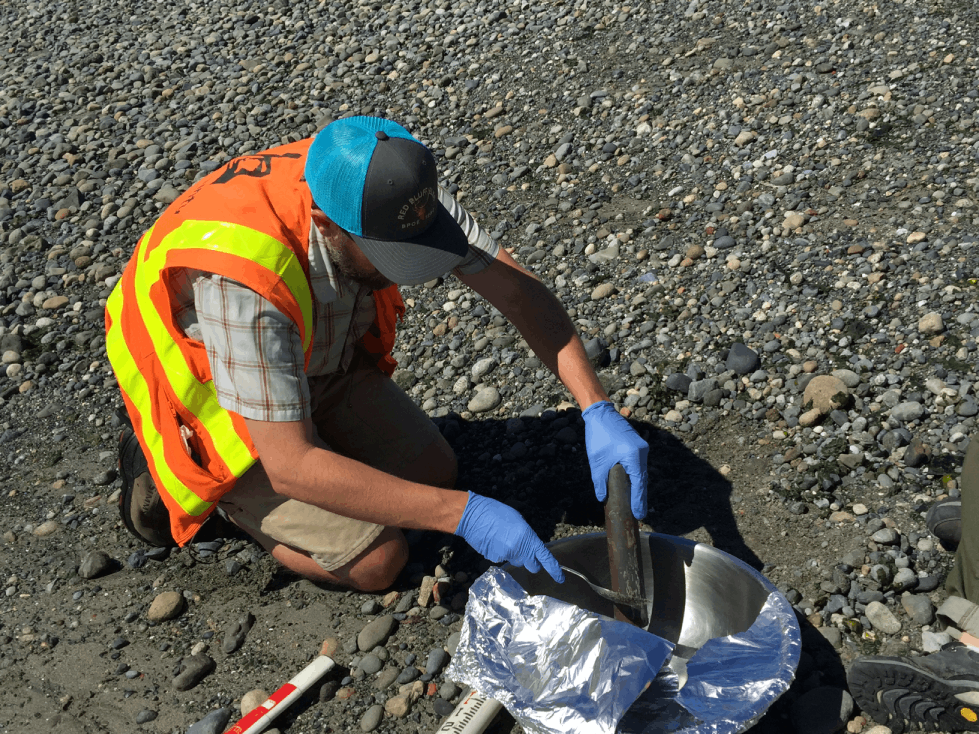Intertidal (Beach) Sediment Chemistry

King County has sampled intertidal (beach) sediments since 1988. The program started with two stations: Carkeek Park and North Beach. Sites have been added and removed since 1994, with the number of sites being reduced to seven in 2025 with a programmatic update. These sites are at beaches near wastewater outfalls, as well as sites that are further away from these sources and used for comparison. Sampling sites are located along the shoreline from Richmond Beach (north) to near the Vashon Treatment Plant Outfall (south), within the King County wastewater service area.
Samples were typically collected every year prior to 2005, every 5 years between 2007 and 2022, and every 4 years from 2026 on. These samples are collected in August and were originally collected alongside shellfish tissue samples in order to compare the amount of contaminants that settle into the sediments to those that are filtered by shellfish. The shellfish tissue monitoring program was discontinued after 2010, but intertidal sediments continue to be sampled in August to control for potential seasonal differences in the long-term dataset.
We collect the top 5 centimeters of sediment from above the average low tide line using a hand core. Several cores are mixed and placed in sample containers. Then, the King County Environmental Lab analyzes the samples for physical and chemical parameters. This includes the 47 chemicals of concern listed in Washington State’s Marine Sediment Management Standards (SMS) (Chapter 173-204 WAC), total solids, total organic carbon, grain size, and additional metals and organic chemicals.
More Information
The goals of this monitoring are to:
-
Track changes in sediment chemistry between sampling years at sites inshore of wastewater facilities.
-
Compare chemical concentrations to applicable Washington State sediment quality standards.
| Parameter Type | Parameter | Method* |
|---|---|---|
| Conventionals | Total solids | SM 2540-G |
| Particle size distribution | ASTM D422 | |
| Total organic carbon | EPA 9060 (SW-846); PSEP, 1996 | |
| Metals | Mercury | EPA 7471B (SW-846) |
| SMS metals (arsenic, cadmium, chromium, copper, lead, mercury, silver, zinc) | EPA 3050B/6020B (SW-846) | |
| Aluminum, iron | EPA 3050B/6020B (SW-846) | |
| Organics | PAHs | EPA 3550C /8270E (SW-846) |
| Phthalates | EPA 3550C /8270E (SW-846) | |
| PCB Aroclors | EPA 8082A (SW-846) | |
| SMS chlorinated semi-volatile organics | EPA 3550C /8270E (SW-846) | |
| SMS misc. non-polar organics | EPA 3550C /8270E (SW-846) | |
| SMS polar organics | EPA 3550C /8270E (SW-846) |
*For more details on methods and detection limits refer to the most recent sampling and analysis plans.
SMS = sediment management standard
Download Data
Download data from our online database.
Note: some data may be provisional. Contact MarineWQ@kingcounty.gov for information about the most recent quality control of data.
Documentation
Learn more about our program by reading documents such as the latest sampling and analysis plan and read relevant reports and presentations.
Contact us with any questions or access additional resources in the Science Section Library.
 Translate
Translate